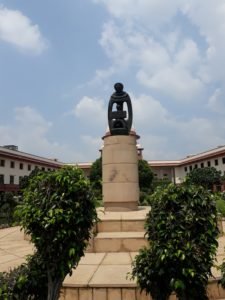The case originates from a Power Purchase Agreement (PPA) dated 28.01.2010 for the supply of 1200 MW. A key event occurred on 19.12.2017, when Coal India Limited (CIL) issued a notification imposing an Evacuation Facility Charge (EFC) effective from 20.12.2017. Respondent No.1 informed the appellants on 20.12.2017 that this notification constituted a ‘change in law’ event under the PPA.
Respondent No.1 initially filed a petition before the Rajasthan Electricity Regulatory Commission (RERC), which denied some reliefs. Respondent No.1 then appealed to the Appellate Tribunal for Electricity (APTEL). The APTEL, in its judgment dated 18.04.2024, held that the CIL Notification of 19.12.2017 was a ‘change in law’ event and entitled Respondent No.1 to compensation from the date of the Notification, citing GMR Warora Energy Ltd. v. CERC. The APTEL also granted carrying cost at Late Payment Surcharge (LPS) rates, which was later modified to exclude carrying cost for the 332 days of delay in re-filing the appeal. The appellants then appealed this decision to the Supreme Court.
Law Involved The judgment primarily involved the interpretation of:
- The Electricity Act, 2003:
Section 86: Powers of the RERC.
Section 111: Appeals to the APTEL.
Section 125: Appeals to the Supreme Court, requiring a substantial question of law.
- The Power Purchase Agreement (PPA):
Article 10.2 (Application and Principles for computing impact of Change in Law): This Article, along with Article 10.5, was the core of the dispute regarding compensation for ‘change in law’.
Article 10.5 (Tariff Adjustment Payment on account of Change in Law): Specifies when tariff adjustment occurs due to a ‘change in law’.
Article 10.5.1: Defines the effective date for adjustment due to ‘change in law’.
Article 8.8 (Payment of Supplementary Bill): Deals with the process of raising and paying supplementary bills, including late payment surcharge.
- Precedents on ‘Change in Law’ and Compensation:
GMR Warora Energy Ltd. v. CERC (2023) 10 SCC 401: This case was extensively referenced for principles of compensation, including that a CIL circular, while not a “law” itself, can be a “change in law” if it affects economic position.
Uttar Haryana Bijli Vitran Nigam Ltd. v. Adani Power Ltd. (2019) 5 SCC 325 and Uttar Haryana Bijli Vitran Nigam Ltd. v. Adani Power (Mundra) Ltd. (2023) 2 SCC 624: These judgments further elaborated on the concept of ‘change in law’ and the principle of restoring the affected party to the same economic position. These cases also clarified that carrying cost should be on a simple interest basis if compound interest is not specified.
Reasoning: The Supreme Court, having reviewed the arguments and the APTEL’s decision, implicitly affirmed the principles established in prior judgments regarding ‘change in law’ events and compensation in power sector agreements.
1.’Change in Law’ Compensation: The Court’s implicit acceptance of the APTEL’s finding means that a notification imposing charges (like the EFC by CIL), even if not a “law” itself, can trigger compensation under the ‘change in law’ clause of a PPA if it impacts the economic position of the power generator. The purpose of such compensation is to restore the affected party to the same economic position they would have been in had the ‘change in law’ not occurred.
2.Carrying Cost and Delay: The Court considered the appellants’ arguments regarding carrying cost for the delay in filing the appeal by Respondent No.1. The APTEL had allowed the condonation of delay but adjusted the carrying cost for the 332-day delay in re-filing the appeal. The Supreme Court’s prior rulings distinguished between Late Payment Surcharge (LPS), which is for delayed payment of a supplementary bill, and carrying cost, which is for the time value of money. Crucially, carrying cost, if due, should generally be calculated on a simple interest basis unless the PPA explicitly provides for compound interest. The “X.CONCLUSION” in the source indicates that the appellant (Discoms) would not be entitled to carrying cost for the delay of 332 days in filing the appeal, implying that the burden of this delay’s cost would not be passed on to the Discoms.
3.Scope of Appeal: The Court confined its scope to the interpretation of Article 10.2.1 vis-à-vis Article 10.5 of the PPA. The “no merit” finding suggests that the appellants’ challenges within this scope were found unsustainable.
Holding: The Supreme Court dismissed the appeal. This means the judgment of the Appellate Tribunal for Electricity (APTEL) was upheld, affirming that:
- The CIL Notification imposing Evacuation Facility Charges (EFC) constituted a ‘change in law’ event, entitling Adani Power Rajasthan Ltd. to compensation.
- The appellants (Rajasthan Discoms) are entitled to the benefit of the EFC (implying the charge can be passed through to them).
- However, the appellants shall not be entitled to carrying cost (or LPS rates) for the 332 days of delay in filing the appeal.
- The matter is remanded to the RERC to compute the exact amounts owed.
Jaipur Vidyut Vitran Nigam Ltd. And Others V. Adani Power Rajasthan Ltd. And Another
Supreme Court: 2025 INSC 770: (DoJ 23-05-2025)






